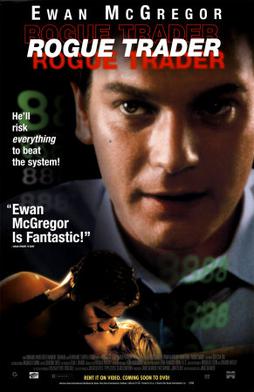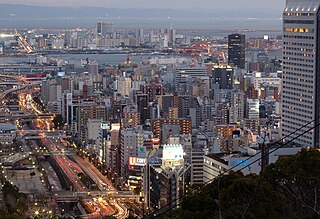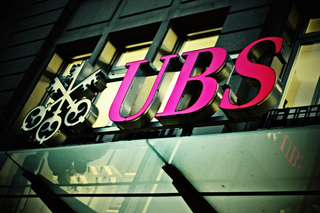
Barings Bank was a British merchant bank based in London, and one of England's oldest merchant banks after Berenberg Bank, Barings' close collaborator and German representative. It was founded in 1762 by Francis Baring, a British-born member of the German-British Baring family of merchants and bankers.
Nicholas William Leeson is an English former derivatives trader whose fraudulent, unauthorized and speculative trades resulted in the 1995 collapse of Barings Bank, the United Kingdom's oldest merchant bank. Leeson was convicted of financial crime in a Singapore court and served over four years in Changi Prison.
In finance, a straddle strategy involves two transactions in options on the same underlying, with opposite positions. One holds long risk, the other short. As a result, it involves the purchase or sale of particular option derivatives that allow the holder to profit based on how much the price of the underlying security moves, regardless of the direction of price movement.
Bank fraud is the use of potentially illegal means to obtain money, assets, or other property owned or held by a financial institution, or to obtain money from depositors by fraudulently posing as a bank or other financial institution. In many instances, bank fraud is a criminal offence. While the specific elements of particular banking fraud laws vary depending on jurisdictions, the term bank fraud applies to actions that employ a scheme or artifice, as opposed to bank robbery or theft. For this reason, bank fraud is sometimes considered a white-collar crime.
Proprietary trading occurs when a trader trades stocks, bonds, currencies, commodities, their derivatives, or other financial instruments with the firm's own money in order to make a profit for itself. Proprietary trading can create potential conflicts of interest such as insider trading and front running.
Yasuo Hamanaka was the chief copper trader at Sumitomo Corporation, one of the largest trading companies in Japan. He was known as "Mr. Copper" because of his aggressive trading style, and as "Mr. Five Percent" because that is how much of the world's yearly supply he controlled.

Rogue Trader is a 1999 British biographical drama film written and directed by James Dearden and starring Ewan McGregor and Anna Friel. The film centers on the life of former derivatives broker Nick Leeson and the 1995 collapse of Barings Bank. It was based on Leeson's 1996 book Rogue Trader: How I Brought Down Barings Bank and Shook the Financial World.

Re Barings plc [2000] 1 BCLC 523 is a leading UK company law case, concerning directors' duties of care and skill. The case is formally identified and cited as "No 5", though some observers regard it as the sixth in the saga of litigation concerning Barings Bank.

Jérôme Kerviel is a French rogue trader who was convicted and imprisoned in the 2008 Société Générale trading loss for breach of trust, forgery and unauthorized use of the bank's computers, resulting in losses valued at €4.9 billion.
In January 2008, the bank Société Générale lost approximately €4.9 billion closing out positions over three days of trading beginning January 21, 2008, a period in which the market was experiencing a large drop in equity indices. The bank states these positions were fraudulent transactions created by Jérôme Kerviel, a trader with the company. The police stated they lacked evidence to charge him with fraud and charged him with breach of trust and illegally accessing computers. Kerviel states his actions were known to his superiors and that the losses were caused by panic selling by the bank. Société Générale's own wrongs were later established by a French jurisdiction, which led the Cour de cassation to cancel the €4.9 billion sanction on Kerviel.

An error account is a type of account used for storing compensation for errors in trading, a transaction that is not posted in a timely manner because of inconsistencies, such as an incorrect account or routing numbers to the wrong name on the account, producing a claim that needs to be resolved as soon as possible so payments can be made.
Convergence trade is a trading strategy consisting of two positions: buying one asset forward—i.e., for delivery in future —and selling a similar asset forward for a higher price, in the expectation that by the time the assets must be delivered, the prices will have become closer to equal, and thus one profits by the amount of convergence.
Inside Story Special: £830,000,000 – Nick Leeson and the Fall of the House of Barings, sometimes referred to as 25 Million Pounds, is a 1996 British television documentary by filmmaker Adam Curtis. It details the collapse of Barings Bank in the mid-1990s due to the machinations of Nick Leeson, who lost £827 million primarily by speculating on futures contracts.

The 2011 UBS rogue trader scandal caused a loss of over US$2 billion at Swiss bank UBS, as a result of unauthorized trading performed by Kweku Adoboli, a director of the bank's Global Synthetic Equities Trading team in London in early September 2011.
Kweku Adoboli is a Ghanaian investment manager and former stock trader. He was convicted of illegally trading away US$2 billion as a trader for Swiss investment bank UBS. While at the bank he primarily worked on UBS' Global Synthetic Equities Trading team in London, where he engaged in what would later be known as the 2011 UBS rogue trader scandal. After serving a prison sentence, he lost several appeals against the UK Home Office decision to deport him to Ghana.
The forex scandal is a 2013 financial scandal that involves the revelation, and subsequent investigation, that banks colluded for at least a decade to manipulate exchange rates on the forex market for their own financial gain. Market regulators in Asia, Switzerland, the United Kingdom, and the United States began to investigate the $4.7 trillion per day foreign exchange market (forex) after Bloomberg News reported in June 2013 that currency dealers said they had been front-running client orders and rigging the foreign exchange benchmark WM/Reuters rates by colluding with counterparts and pushing through trades before and during the 60-second windows when the benchmark rates are set. The behavior occurred daily in the spot foreign-exchange market and went on for at least a decade according to currency traders.
Howard Hubler III, known as Howie Hubler, is an American former Morgan Stanley bond trader who is best known for his role in the forth largest trading loss in history. He made a successful short trade in risky subprime mortgages in the U.S., but to fund his trade he sold insurance on AAA-rated mortgage-backed collateralized debt obligations that market analysts considered less risky, but also turned out to be worthless, resulting in a massive net loss on his trades. His actions while handling credit default swaps (CDS) directly resulted in the loss of roughly US$9 billion during the 2007–08 financial crisis—the largest single trading loss in Wall Street history when adjusted for inflation, and the largest at the time. The only bigger single losses in nominal terms came in in 2012 with Bruno Iksil and in 2021 when Bill Hwang lost around $10 billion on total return swaps.
Tom Hayes is a former trader for UBS and Citigroup who was sentenced to 14 years in prison for dishonestly driving manipulation of the London Interbank Offered Rate (Libor), a bank reported interest rate, to enhance his trading results, which became known as the Libor scandal. Hayes, in the course of his defence, asserted managers were aware of his actions, and even condoned them. At trial Hayes was diagnosed with mild Asperger syndrome.
Mismarking in securities valuation takes place when the value that is assigned to securities does not reflect what the securities are actually worth, due to intentional fraudulent mispricing. Mismarking misleads investors and fund executives about how much the securities in a securities portfolio managed by a trader are worth, and thus misrepresents performance. When a trader engages in mismarking, it allows him to obtain a higher bonus from the financial firm for which he works, where his bonus is calculated by the performance of the securities portfolio that he is managing.





